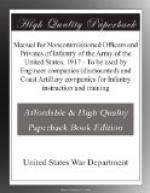No. 5: To quit my post only when properly relieved.
167. If relief becomes necessary, by reason of sickness or other cause, a sentinel will call, “Corporal of the guard, No. (——), Relief,” giving the number of his post.
168. Whenever a sentinel is to be relieved, he will halt, and with arms at a right shoulder, will face toward the relief, when it is 30 paces from him. He will come to a port arms with the new sentinel, and in a low tone will transmit to him all the special orders relating to the post and any other information which will assist him to better perform his duties.
No. 6: To receive, obey, and pass on to the sentinel who relieves me, all orders from the commanding officer, officer of the day, and officers and noncommissioned officers of the guard only.
169. During his tour of duty a soldier is subject to the orders of the commanding officer, officer of the day, and officers and noncommissioned officers of the guard only; but any officer is competent to investigate apparent violations of regulations by members of the guard.
170. A sentinel will quit his piece on an explicit order from any person from whom he lawfully receives orders while on post; under no circumstances will he yield it to any other person. Unless necessity therefor exists, no person will require a sentinel to quit his piece, even to allow it to be inspected.
171. A sentinel will not divulge the countersign (pars. 209 to 217) to anyone except the sentinel who relieves him, or to a person from whom he properly receives orders, on such person’s verbal order given personally. Privates of the guard will not use the countersign except in the performance of their duties while posted as sentinels.
No. 7: To talk to no one except in line of duty.
172. When calling for any purpose, challenging, or holding communication with any person a dismounted sentinel armed with a rifle or saber will take the position of port arms or saber. At night a dismounted sentinel armed with a pistol takes the position of raised pistol in challenging or holding communication. A mounted sentinel does not ordinarily draw his weapon in the daytime when challenging or holding conversation; but if drawn, he holds it at advance rifle, raise pistol, or port saber, according as he is armed with a rifle, pistol, or saber. At night in challenging and holding conversation his weapon is drawn and held as just prescribed, depending on whether he is armed with a rifle, pistol, or saber.
No. 8: In case of fire or disorder to give the alarm.
173. In case of fire, a sentinel will call, “Fire, No. (——),” adding the number of his post; if possible, he will extinguish the fire himself. In case of disorder he will call, “The Guard, No. (——),” adding the number of his post. If the danger be great, he will in either case discharge his piece before calling.
No. 11: To salute all officers and all colors and standards not cased.




